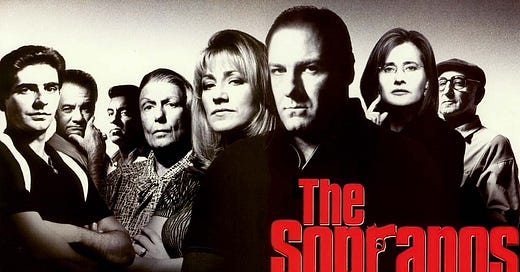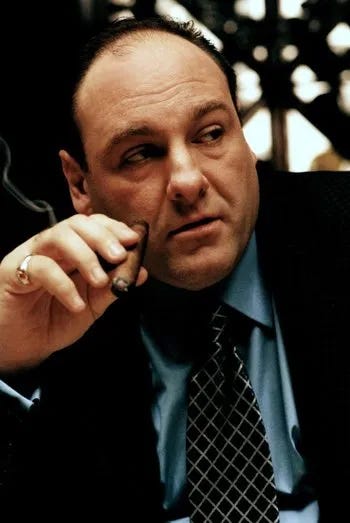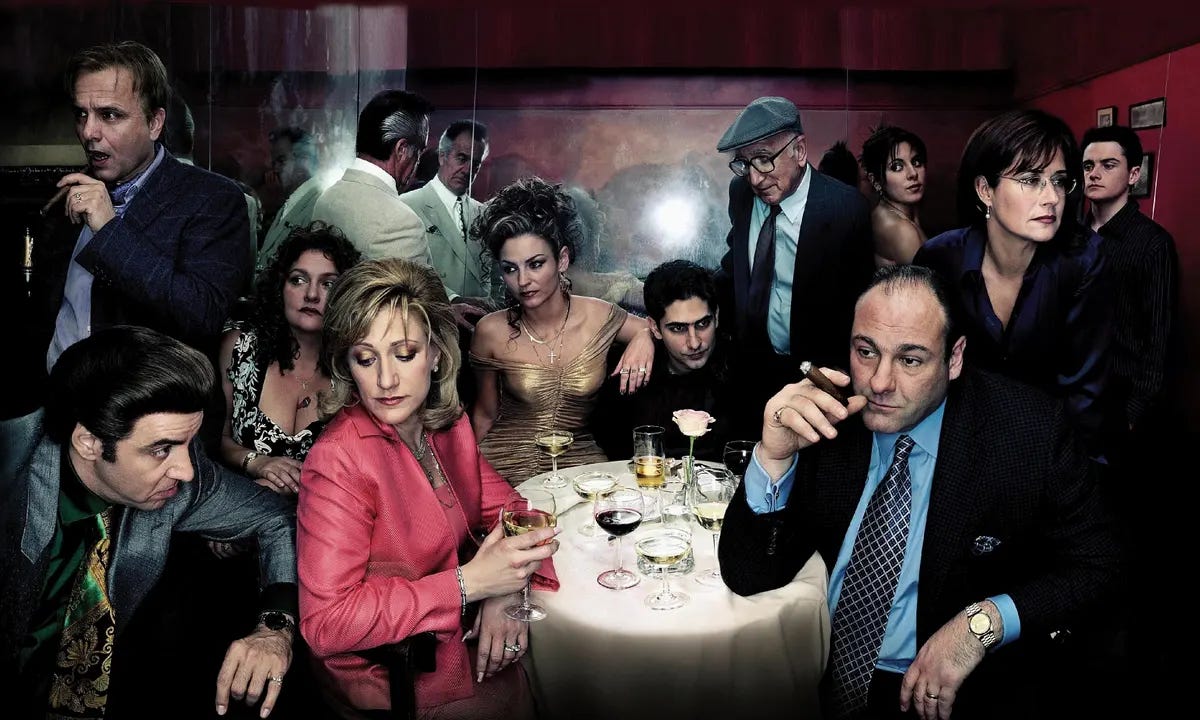The Sopranos: A look at its antihero and what it can teach us about the human mind
Let's look at what this TV show can tell us about our own psychology.
The last time I wrote about a movie was about V for Vendetta and it was a school paper. Although I had poured my heart and soul into that paper my school teacher insisted that it must have been copied from the internet and failed me. *childhood traumas, amIright?
However, I was about 14-15 at the time, and with how much time I’ve spent looking at shows and movies I’ve decided that it’s time to get back into analyzing movies and shows for three reasons:
Firstly, my innate feeling of “I’m wasting my time watching a movie” can be changed by a curiosity of “let’s see what we can learn from it.”
Secondly, as someone with HORRIBLE memory who’s been told over and over again that I don’t have memory problems but attention problems, I’ll assume that paying enough attention so you can write an article about the show or movie you’re watching should really help with my memory/attention problem.
Thirdly, none of you is marking my analysis, so hopefully, you enjoy them and they can spark discussions, but I don’t have to go again through the frustration of someone failing you for something you know was good and you put effort in.
Official warning: I’ll try to make this light and not go into too many spoilers, but be aware, there are spoilers ahead.
The Sopranos: A must-watch series
First things first, what is The Sopranos?
Well, if you were like me two years ago, you might have never heard of it before. However, if you’re more cultured and can remember names, The Sopranos will be a show you probably have already seen a few times and sits somewhere at the top of your favorites list.
But, for those of you like Cristina in 2021, The Sopranos is an iconic and multiple award-winning American television drama series created by David Chase, which aired from 1999 to 2007 on HBO.
The show revolves around Tony Soprano, a mob boss in New Jersey, as he navigates the challenges of balancing his criminal empire with his personal and family life. Tony, portrayed by James Gandolfini, seeks therapy to cope with debilitating panic attacks, the pressures of his violent profession, and his strained relationships at home.
Like any other good TV show, this series explores themes of power, family, mental health, loyalty, addiction, and morality, blending intense drama with dark humor. It manages to put a smile on your face even after showing you the lowest of what humans are capable of.
Its rich character development and complex portrayal of both the Mafia and suburban life alongside the beautiful cinematographic style and storytelling that it has makes it a must-watch show.
Honestly, I cannot stress it enough, if you haven’t seen it, GO WATCH IT.
Tony Soprano: An antihero like no other
One of the things that makes The Sopranos so good is Tony Soprano. He is both the hero and the villain of the story. The unique storytelling and acting that the show has makes you identify, understand, and sympathize with a full-on criminal. Sometimes you even despise him for what he does, but the deeper you go into the series the harder it is to just have a white or black opinion of Tony.
On one side, Tony is a family man. He cares for his family, he provides for them, and he is a loving father and sweet husband—alas not perfect. He is also the son of a dysfunctional family and is constantly trying to deal with his past traumas and troubled relatives. This side of Tony is both a hero and a victim. Something many of us can identify with.
On the other side, he is a Mafia boss. He kills, tortures, and walks on the side of criminality every day. He manipulates and goes to unthinkable extremes to get what he wants. He has been hardened by this life and its deadly responsibilities. This side of Tony is the one that troubles us the most but also allows us to understand and consider the complexities of the human mind and the human experience.
A bridge to both of these sides is the psychological therapy he attends to.
Some internet sites will put him as the first antihero, however, that’s not true. What’s a truer statement is that he is one of the best antiheroes that have ever existed and the one that took more risks and pushed his character—and the viewer's acceptance—to the limit.
However, I also think that one of the aspects that made this character such a good antihero was James Gandolfini’s acting. I think with some other actor the impact wouldn’t have been as profound.
Tony’s smile and general vibe when he is on his “good side” really sweetens your heart. You look at him and can’t help but think of him as a wounded dog. You just want to give him pats and tell him everything will be fine. But the way he transforms when he is about to kill someone or when he makes a tough decision to keep the Mafia family out of trouble is one that you wish you would never have to encounter on the street.
This spectacular acting of Gandolfini raises the bar for antiheroes. I even remember when I watched Breaking Bad. Of course, there’s a side of you that sympathizes with Walter White and the reason he starts to become a criminal, but once he is Heisenberg is harder to get to feel sorry for him—at least not to the same extent you do with Tony.
Additionally, The Sopranos allows us to see much more of Tony’s subconscious mind. There are dream episodes, flashbacks, and long therapy sessions where you see beyond his actions and get to know him at a deeper level. You’re witness to the ethical and moral dilemmas he faces, and how he honestly sometimes wishes he had another life.
This is an antihero who understands he is an antihero, but at the same time, is not willing to pay the price for leaving this criminal life because of how deep he is in it.
Something that breaks my heart is towards the end of the series; you can see how he has realized that there are only a few different ways that life will end up for him: either at a prison, alone and weak at a nursing home, or in a grave (and not for medical reasons IykwIm). So despite all the hard work he has put in building a family (a real one and a Mafia one), and getting to the top, the only outlook was as grim as a Gothic city’s sky. You see him constantly battle with this, and it’s something that the series finale points to.
He is a walking contradiction like no other, but this, I believe, is something we can all sympathize with. At any point in our life, we can look at our actions, thoughts, and emotions and realize that there are many instances where we, like Tony, act in ways that do not follow our own morality and ethical code to the letter. Despite not being criminals and maybe being less contradictory than him we do battle with the same internal demons as him. After all, we’re only human.
Life’s dilemma: Choosing between present comfort and future struggle or present struggle for future comfort
Let’s be honest: with any mob movie or show, there’s a part of us that envies that life. As a spectator, is fun to daydream about the luxury-filled lives that we would have if we were part of a criminal family.
The power, the money, and even the brotherhood may seem appealing at first, but we all know why we don’t do it. It is not only the fact that it’s illegal, but we know all the downsides that such a life has.
Being constantly afraid of being caught, never being able to put full trust in others, the dangers that there are in that life, the death and life decisions you have to make, and many other problems steer us very far away from that life as law-abiding citizens.
In The Sopranos, it’s very interesting to see how there’s like a bit of a rollercoaster with that idea. In the beginning, you are smitten by that life. You see Tony, with his rich family, little to no problem, a sweet house with a pool, and being able to “own” the city. But slowly (and maybe not as slowly as you would expect) the series shows you exactly what the price of that life is.
Almost every session that Tony has with the therapist is another look at just how bad it can be, and how much he struggles with it. Whenever he gets better or starts to act more humanely and appropriately for himself and his good life, you see how that has preposterous effects on his criminal life. There’s no escape. There’s no way in which he can do both: keep living that life being a mafia boss and not be affected by it because simply we humans are not made for it.
All of us in our lives have had moments in which we could have chosen a path that would lead us down a narrow and horrible road, but we don’t do it. Sure, maybe we haven’t had enough trauma, or experiences that have steered us that way, but we still have decided at the end of the day not to go down that path.
Tony is no different. He knows what he should do. He knows what would be best for himself and even his family in the long run, but he made a decision to go down the criminal path. Sure, it was instilled in him from a very young age, with his father also being in the Mafia, but even Tony decided his son shouldn’t do the same as him because he knew what would happen to him.
Tony struggles with his criminal life but he has made that decision, and as a father, he can not stand seeing his children down the same path.
So, yes, Tony was a victim of his upraising and family. There’s no denying that, but he also had the agency to pursue a different life, but he wouldn’t do it. And although he has seized that opportunity and lived very well off from it, he also knows the price he is paying for that. Especially during the later seasons where there are wars with other families and the FBI is constantly breathing down his neck.
This element of having made a decision despite knowing the aftermath is something that also happens to Carmela, Tony’s wife. She also goes to a psychologist who tells her to leave Tony, after all, that’s what Carmela wants deep down. But she doesn’t. Because she is more willing to pay the price of that comfort she gets and the dream united family she wants than to go through whatever she has to go through to leave him.
Carmela even says at times that she knew what she was getting into when she met him. And despite knowing about his family and his money, she still married him. So sure, Tony is unfaithful to her, and she has to deal with the ups and downs of being a Mafia boss’ wife, she struggles to accept it, but deep down she knows that not only did she decide to marry him, but she continues to decide to stay, day after day, after day.
This applies to our own lives as well—perhaps not to the same extreme, but think about how often we make decisions that go against our long-term well-being, driven instead by the desire for immediate relief or comfort.
We’re not that far off from Tony, Carmela, or the many other characters who struggle with this dichotomy daily. I would like to think that if we could see our future selves in 20, 30, or 40 years, seeing what kind of diseases or financial futures we’ve built for ourselves we would change something that we do now. However, I do feel many of us will continue down the same path because it’s easy and comfortable, and it brings us some type of joy in the present moment.
This is something that happens during the first part of the final season where Tony’s uncle shoots him. True, it wasn’t another Mafia boss trying to settle some argument or the police, but he finally got closer to the utmost cost of living that life.
Although we see Tony go through a bit of an awakening trying to become a better human, having realized that it’s not the money or the big deals that make life worth living but simply being with his family and loving them, he slowly turns again into the Mafia boss that we know. Because at the end of the day, he is still willing to choose that life to preserve what he has, instead of the other life he could have.
Lastly, over and over we see Tony blaming his “misfortunes” and mad decisions on his family history, but the only person who can be blamed here is himself. And ultimately, he has to pay the price for his decisions.
There’s a heartbreaking scene where Tony’s sister is getting better with her anger management issues (something that Tony also has, and for whom he constantly blames his mother), but because he sees her taking agency of her life and trying to improve those “hereditary” problems, he does everything to spark her anger. When she does succumb to it, he cannot help but smile to himself. A twisted way of saying “See? If I can’t get better, neither can you. This is a curse we’ve been put and it’s beyond our control”—a way to justify his lack of improvement (and effort) in those areas.
This theme in the show should make us consider a few questions:
For which of my decisions or actions am I blaming others for?
What’s the life I really want to live and what’s stopping me from choosing it?
Where in my life am I choosing present comfort and future struggle over present struggle and future comfort?
There’s A LOT more that could be discussed about this unbelievably amazing show. I mean, you could even write a whole series of books about it, just discussing the finale would be a thick chapter. But for now, we will leave it there.
What I want to point out, as many have done before me, is that this show is an incredible study of the human mind. How our traumas shape us, how our subconscious is constantly speaking to us, the role of self-hatred, the different dilemmas we have to navigate in our daily lives, the expectations we have on others, the pressures that family can put on us, our hypocritical actions, and muuuuch more.
But if you can only take one message from this article is this: WATCH THE SOPRANOS NOW.
Ok, being more serious, the real takeaway is that we are super complex creatures and in our decisions there’s more than a simple train of thought making that decision. There are plenty of factors that go into everything that we do, say, and think, and without a disciplined self-study (nod back to my posts about the yoga philosophy) is easy to end up in places in our lives that we never wanted to be.
So, homework for you if I can say so:
Get some popcorn
Watch The Sopranos
Get a journal and start studying yourself
That’s it for today!
As always, thank you for reading!
Let me know if you enjoyed this kind of analysis, kind of rambling about The Sopranos, and if you would like to read more things like this. 😁
Don’t be shy and send me a message letting me know what you think of the show and if you agree with my thoughts on it or if there are any differences. It’s always nice to discuss great TV. 😉
See you soon in the next issue of MindfulMess.
With MindfulMessy love,
Cris. 💌







